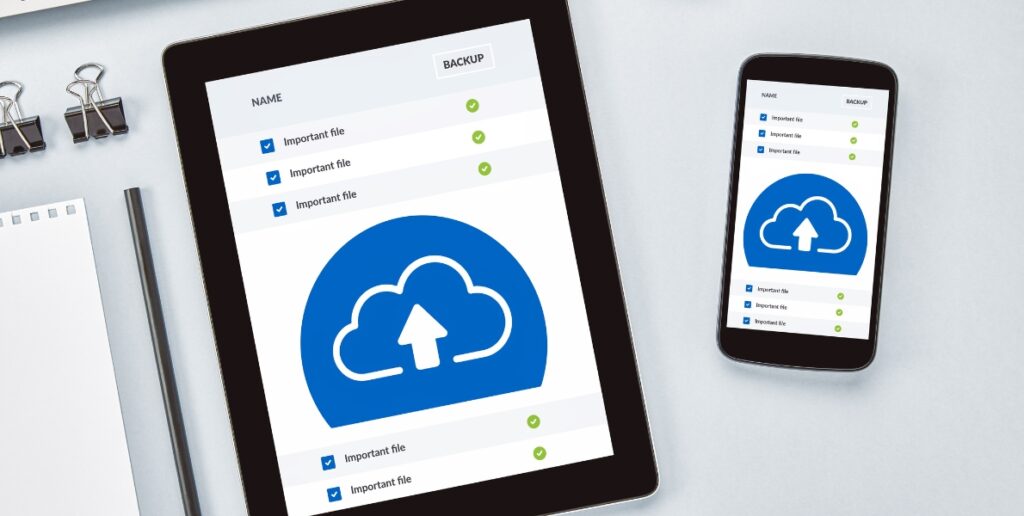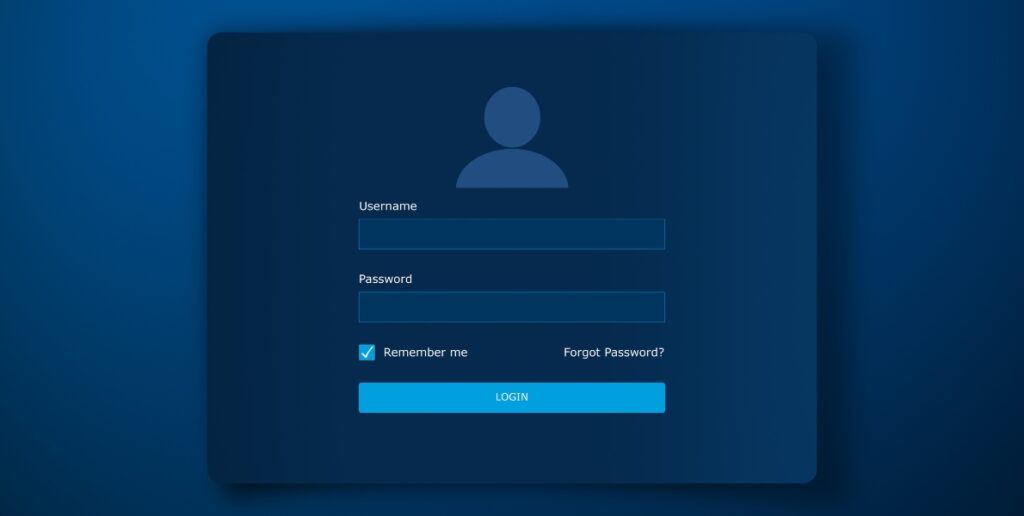As professional web designers and SEO experts, we’ve seen our fair share of online horror stories. Imagine this: a website so insecure, it thought “admin” was a strong password. Sounds like a joke, right? But in reality, the consequences of inadequate website security and the absence of regular backups are no laughing matter. They can lead to data breaches, cyber-attacks, and a compromised reputation that’s tough to rebuild.
Our expertise in website security and backups has shown us that a secure website isn’t just an option; it’s a necessity in today’s digital landscape. Cybersecurity threats are evolving, and so should our defenses. From choosing the right hosting plan to ensuring your online presence is backed up and recoverable, every step is crucial in safeguarding your site from cyber attacks that compromise websites daily.
The Foundation of Website Security

At the core of a secure online presence is robust website security. It’s the shield that protects your digital domain from the onslaught of cyber threats. Understanding and implementing foundational security measures can significantly reduce the risk of your website becoming a statistic in the growing list of compromised online spaces.
Understanding Website Security
Website security encompasses more than just warding off cyber attacks; it’s about creating a secure environment where your website can operate safely. A secure website begins with a reliable hosting plan, which lays the groundwork for defending against data breaches and other cybersecurity threats. By prioritizing security from the start, website owners can significantly reduce the likelihood of having their websites compromised.
The Role of SSL Certificates
SSL certificates play a pivotal role in website security. They encrypt the data transmitted between a user’s browser and the website, ensuring that sensitive information like passwords and credit card numbers are protected from prying eyes. An SSL certificate is not just a security measure; it’s a trust signal to your visitors, indicating that your site is secure and their data is safe with you.
Without an SSL certificate, your website is like a house with its doors wide open, inviting cybercriminals to enter. As web security experts, we’ve seen the difference an SSL can make in enhancing a site’s security posture. It’s a fundamental step in building a secure website that users can trust. You can even get an SSL certificate for free from several places, including Let’s Encrypt.
The Importance of Website Backups
In the realm of website security, backups are your safety net. They ensure that, in the event of a disaster, your online presence can be quickly restored. For website owners, implementing a robust disaster recovery plan, including regular website backups, is essential. These backups act as a critical recovery tool, safeguarding your site’s data against loss.
How Regular Backups Can Save Your Website
Regular website backups are the unsung heroes of online presence. They provide a fail-safe way to restore your site should you fall victim to cyber-attacks, technical failures, or human errors. A solid disaster recovery strategy, built on frequent website backups, ensures that your online presence remains uninterrupted, preserving the integrity of your digital domain.
The importance of testing and restoring website backups cannot be overstated. These practices verify the effectiveness of your backups and ensure that, when the need arises, your site can be brought back online with minimal downtime. As experts in website security, we’ve witnessed firsthand how regular backups can be the difference between a quick recovery and a prolonged outage.
Common Threats and How to Combat Them
Mitigating common threats like malware attacks requires a proactive approach to website security. Regular website updates are essential in keeping your site secure. These updates patch vulnerabilities that could be exploited by attackers, reducing the risk of malware infections and minimizing website downtime.
Brute Force Attacks and Their Prevention
Brute force attacks are a relentless attempt to crack your website’s passwords. These attacks can be mitigated by implementing strong password policies and using security tools that limit login attempts. As security professionals, we emphasize the importance of educating website users and administrators about the dangers of brute force attacks and the best practices for preventing them.
Preventing brute force attacks is a critical component of maintaining website security. By employing strategies such as two-factor authentication and monitoring for suspicious login attempts, website owners can significantly enhance their site’s defense against these relentless attacks.
Strategies for Enhancing Website Security

Enhancing website security is an ongoing process that involves identifying vulnerabilities and implementing strategic defenses. As the digital landscape evolves, so too must our approaches to securing our online domains. Through continuous monitoring, regular updates, and the adoption of advanced security measures, we can fortify our websites against the ever-changing threats they face.
Identifying and Addressing Website Vulnerabilities
Identifying and promptly addressing website vulnerabilities is crucial in preventing security breaches. Regular security assessments and vulnerability scans can uncover weaknesses in a website’s architecture, allowing for timely remediation. This proactive stance is essential in building and maintaining a secure online presence.
SQL Injections and Cross-Site Scripting (XSS)
SQL injections and Cross-Site Scripting (XSS) are common attack vectors that exploit vulnerabilities in a website’s code. By injecting malicious code into a site, attackers can gain unauthorized access to sensitive data. Protecting against these threats requires diligent coding practices, including input validation and the use of security measures designed to detect and neutralize malicious code.
Preventing these types of attacks is a critical aspect of website security. Employing web application firewalls (WAFs) and regularly updating software and plugins can provide additional layers of defense, safeguarding your site from the introduction of malicious code and ensuring the security of your users’ data.
Implementing a Defense-in-Depth Strategy
A defense-in-depth strategy involves multiple layers of security measures to protect a website from various angles. This comprehensive approach ensures that if one defense fails, others are in place to thwart potential breaches. Implementing such a strategy is key to creating a resilient online presence capable of withstanding diverse threats.
Ensuring Ecommerce Website Security and PCI Compliance
E-commerce websites, with their treasure trove of customer data and financial transactions, require stringent security measures. Adhering to PCI DSS standards is not just about compliance; it’s about building trust with your customers by ensuring their data is protected against breaches. This level of security is pivotal for any online business looking to maintain credibility and ensure customer loyalty.
Website Security Framework: From Identification to Recovery
A robust website security framework encompasses everything from identifying potential threats to recovering from a breach. This framework serves as a blueprint for creating a secure online environment, capable of withstanding and rapidly recovering from cyber threats.
Preparation & Planning for Security Incidents
Preparation and planning are key components of a successful security incident response. By establishing protocols and assembling a response team in advance, organizations can ensure a swift and effective reaction to security breaches. This readiness is crucial in minimizing the impact of an incident on your online presence.
An effective incident response plan also involves regular training and drills to ensure team members are familiar with their roles and responsibilities. By simulating security incidents, organizations can test their preparedness and fine-tune their response strategies, ensuring they’re ready to tackle real-world challenges.
Effective Detection & Analysis Methods
In our journey as professional web designers and SEO experts, we’ve seen too many websites fall prey to the dark corners of the internet. But fear not! Effective detection and analysis methods are our digital superheroes. First off, employing real-time monitoring tools gives us eyes on our site 24/7, allowing us to spot unusual activity that could indicate a breach. It’s like having a guard dog that never sleeps, but instead of barking, it sends alerts.
Next, let’s talk analytics. By analyzing web traffic and access logs, we can spot patterns that scream “something’s wrong here!” faster than you can say “outdated plugin.” This proactive approach not only helps in identifying security incidents but also plays a crucial role in preventing them. Remember, in the digital world, being reactive is like showing up to a gunfight with a spoon.
Maintaining Website Security and Integrity

As guardians of our online presence, we must uphold the holy trinity of website security: confidentiality, integrity, and availability. It’s a constant battle against threats, but with the right armor, we stand strong. Think of us as the knights in digital armor, protecting our realm from the dragons of cyber threats. And yes, just like in those epic tales, the victory is ours for the taking with diligence and the right strategies.
The Information Security CIA Triad: Confidentiality, Integrity, Availability
In our quest to protect the kingdoms of the internet, we abide by the sacred Information Security CIA Triad. Confidentiality ensures our secrets are safe, integrity keeps our content true, and availability makes sure our online castle gates are open to friendly visitors anytime. This triad is the foundation upon which we build our fortress of security, shielding us from the arrows of cyber villains.
The Importance of Data Availability in Website Security
Imagine you’re running a digital fortress, and the drawbridge is always up. Not very welcoming, right? That’s why data availability is crucial. It ensures that when users come knocking, our website’s doors swing open with a warm digital welcome. This doesn’t just mean keeping our site online; it also involves having a sturdy backup plan. Like a skilled archer with a quiver full of arrows, our backup plan is ready to restore order at a moment’s notice.
But let’s not forget, that ensuring data availability is more than just a friendly gesture; it’s a strategic move. In the face of attacks, natural disasters, or even just clumsy human error, our backup plan acts as our phoenix, rising from the ashes to bring our website back to life. It’s our secret weapon in maintaining an uninterrupted online presence, making sure our digital realm remains steadfast and strong.
Automated Website Attacks: Understanding the Risks
Automated website attacks are like pesky mosquitoes at a summer barbecue – annoying, persistent, and potentially dangerous. These attacks don’t discriminate, targeting websites big and small in their quest for vulnerabilities. Here’s where having a robust hosting plan comes into play. A good hosting plan acts like a screened porch, keeping those pesky pests at bay while allowing us to enjoy our digital barbecue in peace.
Server Configuration Best Practices
In the realm of server configuration, not all heroes wear capes. Some, like hosting providers, offer the shields and swords needed to protect WordPress websites from the dark forces of the internet. By adhering to best practices such as keeping software up to date, using strong passwords, and employing firewalls, we fortify our digital castles against invaders, ensuring the safety and security of our online domains.
Secure Your Web Servers to Prevent Unauthorized Access
Securing web servers is akin to setting up the ultimate defense system for our digital fortresses. One key player in this defense is the Web Application Firewall (WAF). Think of WAF as the moat around our castle, filled with digital crocodiles ready to snap at unwanted visitors. It scrutinizes incoming traffic, blocking malicious attacks before they can breach our walls.
But our security measures don’t stop at the moat. Implementing strict access controls, encrypting data transfers, and regularly scanning for vulnerabilities ensures that even if intruders get past the moat, they’ll find themselves in a labyrinth of defenses. With WAF and these strategies combined, we create a fortress so secure that even the craftiest of cyber-thieves think twice before attempting a siege.
Practical Steps to Secure Your Website

Securing our website is not just about slaying dragons; it’s about building a kingdom so fortified that dragons think twice before attacking. From the drawbridge (our login page) to the keep (our database), every component matters. Let’s don our armor, raise our swords, and take practical steps to ensure our digital realm remains unconquered.
Updating Software and Systems Regularly
Keeping our website’s software and systems updated is like giving our digital castle the strongest walls. Regular updates patch security holes and fortify defenses, ensuring that our online presence remains robust against the siege engines of hackers. It’s not the most glamorous task, but think of it as the steady maintenance that keeps our castle standing through storms and battles.
Implementing Strong Password Policies
Strong passwords are the secret spells that keep our digital treasures locked away. By implementing strict password policies, we ensure that only the true wizards of our realm – those we trust – can access our magical archives. It’s like having a spell of protection that keeps the dark mages at bay.
Strong Passwords Best Practices
In our quest for digital security, strong passwords are our first line of defense. Think of them as the sturdy doors of our fortress. Crafting a strong password involves a mix of letters, numbers, and symbols – the more complex, the better. It’s like creating a magical incantation that only we know, keeping our treasures safe from marauders.
Additionally, changing these passwords regularly is akin to shifting our castle’s hidden passages. Even if an intruder learns of an entryway, they’ll find it sealed upon their return. And let’s not forget, that using a unique password for each vault and chamber ensures that even if one is breached, the rest of our kingdom remains secure. It’s a strategy as old as time, but in the digital realm, it’s more crucial than ever.
Managing User Access and Permissions Efficiently
In the grand castle of our website, not everyone needs a key to every room. By managing user access and permissions efficiently, we ensure that each inhabitant has just the right level of access. It’s like assigning roles in our digital kingdom, from the knights guarding the gates to the scribes in the archives, everyone plays their part without overstepping their bounds.
Applying the Principle of Least Privilege
The Principle of Least Privilege is our rule of thumb when granting access to our digital realm. It means giving users only the access they need to perform their duties, nothing more. This approach reduces the risk of accidental or intentional misuse of power. It’s like entrusting the castle keys only to those who truly need them, ensuring our defenses remain impenetrable.
In practice, this could mean limiting the access of our content creators to just the blog section or ensuring that our sales team can only view customer data relevant to their transactions. It’s about compartmentalizing our castle’s many chambers, making sure that even if one door is breached, the rest of the kingdom remains secure. A wise strategy for maintaining the integrity of our digital fortress.
Choosing Secure Extensions and Plugins
In the vast marketplace of digital tools, choosing secure extensions and plugins for our website is like selecting the finest armor for our knights. Each piece must be tested for strength and durability, ensuring it enhances our defenses without introducing new vulnerabilities. It’s a critical task that requires a keen eye and a deep understanding of our digital battlegrounds.
Selecting the Best Website Backup Solution
For us website owners, a robust backup solution is our safety net. It’s the unsung hero who steps in when disaster strikes, ready to restore our kingdom to its former glory. Selecting the best website backup solution means looking for one that’s not only reliable but also easy to use. It should be like a loyal steed, ready to carry us to safety at a moment’s notice.
Moreover, this backup solution should offer automatic backups, ensuring our data is saved without needing to remember to do it manually. It’s like having a diligent scribe who copies our scrolls each night, safeguarding our knowledge against the unforeseen. With the right website backup solution, we can sleep soundly, knowing our digital realm is secure, come what may.
Advanced Website Security Measures

As professional web designers and SEO experts, we understand that advanced website security measures are not just an option but a necessity. In a world where digital threats evolve daily, stepping up your security game ensures your online presence remains unbreachable. We often joke about how out-of-date websites are like open treasure chests for hackers, but the truth is, it’s no laughing matter.
Installing Scanning and Monitoring Tools
Our first line of defense involves installing scanning and monitoring tools. These tools act as vigilant watchmen, continuously scanning for any signs of intrusion or unusual activity. It’s like having a security camera system for your website, making sure that nothing slips through unnoticed. Regular scans help in identifying vulnerabilities before they can be exploited, keeping your site a step ahead of potential threats.
The Role of a Website Firewall
Think of a website firewall as the moat around your digital castle. It serves as a barrier, filtering out malicious traffic and blocking unwanted access to your site. In our experience, implementing a robust website firewall significantly reduces the risk of security breaches. It’s an essential layer of protection that ensures only legitimate traffic gets through, keeping the bad guys at bay.
Utilizing a Website Security Service
Leveraging a website security service is like having a team of digital bodyguards for your site. These services offer comprehensive security features, including real-time monitoring, malware removal, and proactive threat defense. As experts in this field, we highly recommend enlisting a professional service to safeguard your online assets. It’s a smart investment in your website’s future and peace of mind.
Additional Website Protection Tools and Resources
Besides the core security measures, there are numerous tools and resources available to bolster your website’s defenses. From security plugins for content management systems to encryption tools that secure data transmission, the options are vast. We advise exploring these additional tools to enhance your site’s security posture further. Remember, in the realm of website security, more layers mean more protection.
The Crucial Role of Backups in Website Security

Backups are the unsung heroes of website security. Imagine accidentally deleting crucial content or, worse, having your site compromised. Without a recent backup, you’re looking at a potential nightmare. As seasoned professionals, we emphasize the critical importance of regular backups. They’re your safety net, ensuring that no matter what happens, your digital presence can be restored swiftly and efficiently.
How to Backup Your Website Effectively
Effective website backups start with a solid plan. As website owners, it’s imperative to regularly backup your entire site, including databases, files, and configurations. Utilizing automated backup solutions within your hosting plan can make this process seamless and reliable. Remember, the frequency and method of backups should reflect the dynamic nature of your site’s content and activity.
Testing and Restoring Website Backups
Having backups is one thing, but testing them ensures they’re actually usable when disaster strikes. Periodically restoring backups to a test environment verifies their integrity and functionality. It’s akin to running fire drills; you want to be sure that in an emergency, your escape plan works flawlessly.
Furthermore, familiarizing yourself with the restoration process reduces downtime during actual recovery scenarios. Quick and efficient restoration not only minimizes the impact on your online presence but also on SEO rankings, which can be adversely affected by prolonged downtime.
Guarding Your Website Content with a Robust Backup Tool
Choosing the right backup tool is crucial for website owners. A robust backup solution offers automated, frequent, and secure backups, ensuring that your website’s data is safely stored and easily retrievable. It’s essential to select a tool that matches your website’s specific needs, considering factors like website size, complexity, and the sensitivity of the data handled.
Use Automatic Backups to Ensure Data Safety
Automatic backups are a game-changer, especially when website functionality is damaged. They provide peace of mind, knowing that your website’s data is continuously protected without manual intervention. By setting up automatic backups, you ensure that the most recent version of your site is always saved, ready to be restored at a moment’s notice, safeguarding against data loss and minimizing operational disruptions.
Navigating Website Security Challenges

Website security is a dynamic battlefield, with new challenges emerging constantly. As experts, we’re committed to staying ahead of the curve, understanding the evolving threats, and implementing cutting-edge defenses. This proactive approach is key to ensuring that your website remains secure, resilient, and trustworthy in the eyes of your users.
Understanding Why Websites Get Hacked
Websites get hacked for a variety of reasons, from stealing sensitive information to spreading malicious code. Hackers often exploit vulnerabilities in outdated software or weak passwords. Understanding these motivations and methods is the first step in fortifying your website against such attacks. It’s a constant game of cat and mouse, but with the right knowledge and tools, we can stay one step ahead.
Responding to Security Breaches
Responding to security breaches swiftly and effectively is crucial. The first step is to identify the breach and isolate the affected systems to prevent further damage. Next, assess the scope of the impact and begin the containment and eradication process, removing any malicious code and securing vulnerabilities. Clear communication with stakeholders and users is also essential during recovery, maintaining transparency and trust.
Containment, Eradication, and Recovery Strategies
Containment involves limiting the spread of the breach, while eradication focuses on removing the cause, such as malicious code. Recovery is about restoring and returning affected systems to their normal operations. Implementing these strategies efficiently minimizes damage and restores security and functionality to your website, ensuring it remains a safe and reliable online space.
Post-Incident Activities: Learning from Security Incidents
After a security breach, it’s crucial we don’t just patch things up and move on. It’s a golden opportunity to learn and strengthen our defenses. Analyzing what went wrong and how the intruders got in helps us prevent similar incidents. We don’t just want to be fixing holes; we want to build a fortress. It’s like saying to hackers, “Nice try, but we’ve learned our lesson.” Plus, sharing insights with others can help them dodge the bullet too. Remember, a website firewall isn’t just a tool; it’s our frontline defender that needs to be kept sharp through continuous learning from these incidents.
Empowering Your Website Security and Backups

Empowering our website’s security isn’t just about installing tools and calling it a day. It’s about creating a culture of security mindfulness within our team and among our users. We ensure that our website is not just a sitting duck for hackers but a moving target that’s hard to hit. By staying informed, making smart security choices, and not skimping on backups, we’re not just protecting data; we’re safeguarding our online presence. It’s like putting our website in a superhero costume, complete with a cape and shield. Who wouldn’t want that?
FAQs on Website Security and WordPress Backups
Let’s tackle some burning questions about website security and backups. First off, yes, every website needs security. It’s not just the big players who are targets; small sites are often easier prey. And guess what? Websites get hacked every day, thousands of them, from mom-and-pop shops to big enterprises. Regular backups? Non-negotiable. They’re your safety net when all else fails. Think of them as your website’s life jacket in a stormy sea of cyber threats. Ready to dive deeper into keeping your site safe? Let’s get to it.
Do I Need Security for My Website?
Imagine leaving your house with the doors unlocked and a sign that says “Come on in.” That’s what having a website without security is like. As web designers and SEO experts, we can’t stress enough how vital security is for every website, big or small. Hackers love low-hanging fruit, and an unprotected site is just that. But it’s not all doom and gloom. With the right measures, we can turn our website into a digital fortress, keeping out unwanted guests. It’s not just about protecting data; it’s about maintaining trust with our visitors.
So, do you need security for your website? Absolutely. In today’s digital age, it’s not a question of if you’ll be targeted, but when. But fear not, with a combination of strong passwords, regular updates, and a reliable website firewall, we can keep the bad guys at bay. It’s like having a guard dog, security cameras, and a high fence all in one. Let’s not make it easy for hackers. After all, an ounce of prevention is worth a pound of cure.
How Many Websites Get Hacked Every Day?
You might be surprised to learn that thousands of websites get hacked every day. Yes, you heard that right, thousands. It’s a staggering number that highlights the importance of robust website security and backups. As professionals in web design and SEO, we’ve seen our fair share of horror stories. Websites without updated security features are like fish in a barrel for hackers. And the consequences? They range from minor nuisances to catastrophic data breaches that can tarnish a brand’s reputation overnight.
But here’s the kicker: most of these attacks are preventable. Regular updates, strong passwords, and, you guessed it, a solid backup plan can make all the difference. Think of backups as your website’s safety net. If something goes wrong, you’re not starting from scratch; you’re merely bouncing back. It’s empowering to know that, despite the risks, we have the tools and knowledge to protect our online presence. Let’s not be part of the daily hacking statistics. Instead, let’s be the ones who set the standard for security and resilience.
Ready to Get Protected? Tips for a Secure Website
Securing your website isn’t just about locking doors; it’s about making sure the digital windows are shut tight too. We always advise our clients to protect their website with layers of security, starting with SSL certificates which are like your website’s digital passport. They tell your customers you’re safe to visit. Next, we emphasize the power of automated backups. With just a click of a button, you can back up your website, ensuring that all your valuable data and website files are stored safely.
Whether it’s cloud storage solutions or a dedicated backup solution, having a plan for both automated and manual backups is crucial. Remember, a good laugh is fine, but leaving your website’s security to chance is no joke. Let’s keep your digital presence locked up tighter than Fort Knox.
Securing Tomorrow: The Future of Website Security and Backups

The future of website security and backups looks brighter than ever, with advanced technologies evolving to outsmart the cunning tactics of cyber threats. As professionals in web design and SEO, we keep our eyes peeled on the horizon for emerging trends. We’re seeing a shift towards more intelligent automated backups and more robust DDoS protection measures, ensuring that not only is your website data safe, but it’s also always available at the click of a button. The key is to stay ahead, constantly updating, and never underestimate the cunning of online threats. The future is about making security and backups so seamless, that you’ll barely know they’re there, but always be glad they are.
Continuous Learning and Adaptation in Website Security
In the ever-evolving world of website security, resting on your laurels is like inviting hackers to a feast at your expense. Continuous learning and adaptation are our mantras. As SEO experts, we know the impact security can have on your engine rankings. A secure website is like a well-oiled machine, running smoothly and ranking high. We dive deep into the latest security threats and countermeasures, ensuring we’re always a step ahead. It’s a never-ending game of cat and mouse, but we’re committed to keeping your digital presence safe, secure, and soaring in the rankings.
Leveraging New Technologies for Better WordPress Security and Backups
In the digital age, leveraging new technologies is not just an option; it’s a necessity for bolstering website security and backups. As we install SSL certificates, we’re not just ticking a box; we’re encrypting data to protect sensitive information that flows between your website and your visitors. But it doesn’t stop there. Backups are critical; they’re the safety net that catches you when you fall. With new technologies, backups are stored more securely and are easier to manage. We’re constantly updating security patches to fix vulnerabilities, ensuring that the bad guys are kept at bay. It’s a dynamic battlefield, but with the right tools and resources, your website can remain a fortress.
Ensuring a Secure and Resilient Website: Final Thoughts
As professional web designers and SEO experts, we understand that protecting your website is no joke. In fact, it’s akin to safeguarding your digital storefront. With the myriad of threats lurking online, it’s imperative to secure your website with robust security measures.
Regular backups should be at the heart of your defense strategy, allowing you to restore your website content even if disaster strikes. Think of backups as your safety net; when everything else fails, they’re your guaranteed way to bounce back. After all, it’s better to be safe than sorry, or as we say in the industry, “sicher sein, bevor meine Website wieder hergestellt werden muss.” By implementing robust backup solutions and utilizing advanced website security tools, you not only protect against malware and damaged files but also ensure you’re prepared to quickly respond to any security breach.
Remember, a resilient website isn’t just about preventing attacks; it’s about being able to recover swiftly and efficiently, ensuring your online presence remains uninterrupted. Let’s not give hackers the satisfaction of disrupting our digital realm. Secure your website, establish regular backups, and let’s keep our online spaces safe and sound.




We love providing tips like these to not only our customers, but everyone out there looking to secure their websites! Give us a shout if you have a Web Design or SEO project!